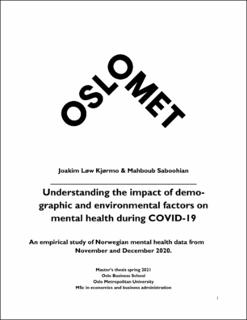Understanding the impact of demographic and environmental factors on mental health during COVID-19 An empirical study of Norwegian mental health data from November and December 2020.
Master thesis
Submitted version
Permanent lenke
https://hdl.handle.net/11250/2823568Utgivelsesdato
2021Metadata
Vis full innførselSamlinger
Sammendrag
The research question looks at the role that gender, age, education, economic situation,
unemployment, and singlehood play on the probability of having considerable mental health
problems
during the COVID-19 pandemic. We have used a multiple logistic regression model on a
dataset
from November and December 2020 from FHI, to answer the research question. The dataset
limits us to a population of Oslo, Agder, Nordland and Vestland.
To summarize the research question; gender, age, economic situation, unemployment, and
singlehood all play a role on the probability of having considerable mental health problems
during
the COVID-19 pandemic. Being a woman, being in the younger age groups, having economic
challenges, unemployment and being single are all associated with a higher probability of
having
considerable mental health problems during the pandemic.
Knowing what role the explanatory factors play on the probability of having considerable
mental
health problems may also be valuable for policy decisions if we were to find ourselves in a
similar situation in the future. By seeing the prevalence of mental health problems in the
different
groups during the pandemic, policy makers should try to ensure that these exposed groups
receive proper consideration before decisions are made.
We hope that this thesis can inspire future research on what we believe to be an immensely
important subject. The economic cost of these problems is extensive, and more importantly -
the
human cost is unaffordable.
